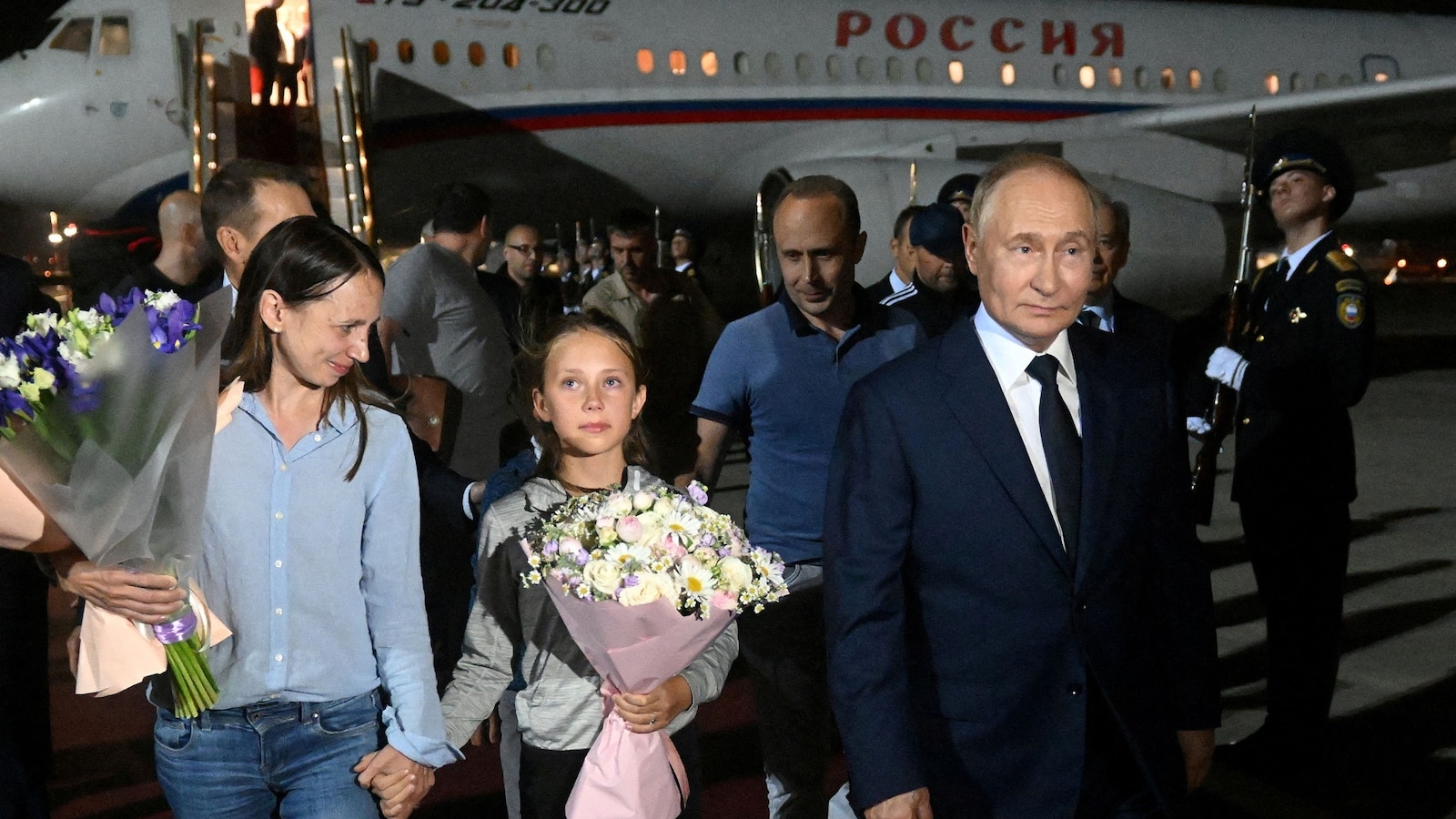The harrowing ordeals of three Americans jailed in Russia came to a happy ending around midnight on Thursday, when they stepped off a plane and into emotional embraces with family members waiting for them on a tarmac at Joint Base Andrews alongside President Biden — the chief architect of the historic prisoner swap that freed them.
Far more complicated than the standard one-for-one trades that have played out between the U.S. and Russia, the far-reaching exchange that led to the release of U.S. citizens Paul Whelan, Evan Gershkovich and Alsu Kurmasheva, another American national, Vladimir Kara-Murza, as well as several political prisoners of various nationalities jailed in Russia, is being heralded as diplomatic feat by the White House.
But analysts say that while the deal– the largest since the Cold War — is indeed the result of skilled statesmanship, it’s also reflective of the diametrically opposed mindsets of Russia and the West, and it could have repercussions across the world stage for years to come.
Vice President Kamala Harris greets Evan Gershkovich, who was released from detention in Russia, upon his arrival at Joint Base Andrews in Maryland, August 1, 2024.
Nathan Howard/Reuters
Subverting election uncertainty
The agreement, which relied on the participation of multiple U.S. allies, took months of negotiations and fully came together only in the last days of July, according to U.S. officials.
Many Russia observers were surprised that Moscow would move to seal the deal now instead of waiting out the U.S. election to see if a more amenable administration would come into power.
But Max Bergmann, the director of the Europe, Russia, and Eurasia Program at the Center for Strategic and International Studies and a former State Department official, says the looming election likely encouraged the Kremlin to close.
“If there’s a change in power in four months, then how is a deal like this struck? You have to start from scratch. So, I could see that creating a degree of forcing function,” he said. “Whether it’s Harris or Trump, you would have to start anew.”
Despite former President Donald Trump’s assertions that he could easily free Gershkovich, the Wall Street Journal reporter arrested in March 2023 while on assignment, Bergmann says the Kremlin likely put more stock in Trump’s actions when he was in office than his words on the campaign trail.
“The Russians remember the first Trump administration,” he said, saying Moscow likely deduced a prisoner exchange “wouldn’t be a first priority” for a second term.
Experts broadly agree that the exchange almost certainly does not indicate Russian President Vladimir Putin is willing to negotiate on other matters, such as the war in Ukraine.
“What this swap demonstrates on the Kremlin’s strategic front is a twisted and self-serving pragmatism that is unlikely to translate into a de-escalation of Russia’s violence in Ukraine, nor into a new appreciation for international norms,” said Mercedes Sapuppo, a program assistant with the Eurasia Center at the Atlantic Council.
“Putin is still a war criminal, and he is still bolstering his autocratic alliances abroad,” she added.

Russian President Vladimir Putin welcomes Russian nationals, including Artyom Dultsev, Anna Dultseva and their children, following a prisoner exchange between Russia with Western countries, during a ceremony at Vnukovo International Airport in Moscow, Russia August 1, 2024.
Mikhail Voskresensky/via Reuters
Virtue signaling
Beyond recovering their nationals, Bergmann says the exchange provided both Russia and the U.S. with an opportunity to convey a message about what the countries value most.
“It wasn’t just about freeing Americans, but also Russian dissidents,” Bergmann said, referencing the seven Russia political activists and human rights advocates who were released by Moscow in the arrangement.
“I think that sends a signal to the Russian people that the United States is also concerned about the future of Russia,” he said.
John Hardie, the deputy director of the Foundation for the Defense of Democracies’ Russia Program, argues that by prioritizing individuals such as Vadim Krasikov, a Russian security agent serving a life sentence in Germany for killing an enemy of the Kremlin, Moscow is sending a very different message to its domestic audience.
“The Russians were freeing Russian intelligence officers — people that had done actions on behalf of the Russian state against the West,” he said. “The Russian interest in doing this is to demonstrate to their people working on behalf of Russia that if they’re captured, that Russia will be there for them.”
Hardie says that could embolden bad actors working for the Kremlin — and further incentivize Putin to hold Americans as prisoner for his own gain.
“If he has people he wants to get back, and Americans he can hold hostage, he’s going to do that,” Hardie said. “He has proven that at this point.”
Testing the network
Biden said the prisoner exchange, like any deal of the nature, required difficult decisions. But unlike other trades with Russia conducted in recent years, it wasn’t just the U.S. government that needed to make hard choices.
The American allies directly involved in the swap — Germany, Norway, Poland, and Slovenia — also needed to hand over convicted criminals without necessarily seeing the same value in the returns as the U.S.
“This is an example of the benefits of having an alliance and then working well with allies and partners,” Bergmann said. “Why you want to do that in foreign policy is because you never know when you’re going to have to knock on the door for a favor.”
But Hardie says that door swings both ways — potentially setting a complicated precedent for hostage diplomacy in the future.
“If we owe somebody and they were trying to get someone they really wanted back, they could ask us to return the favor,” he said. “It’s entirely possible.”
